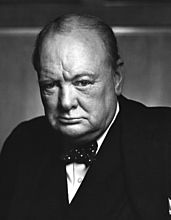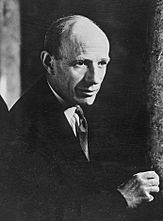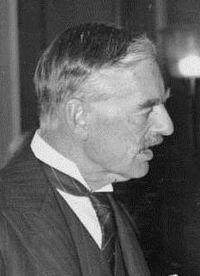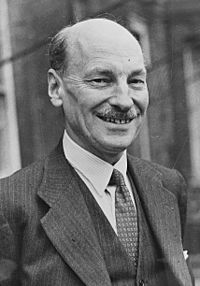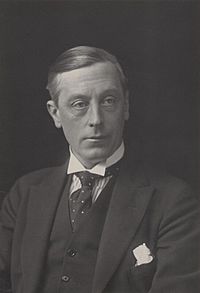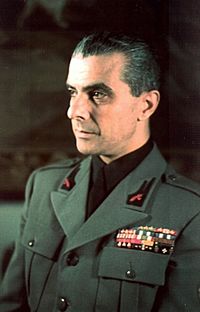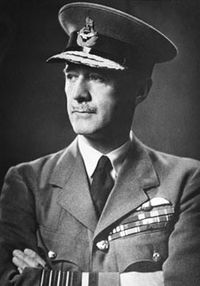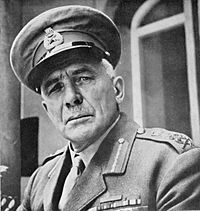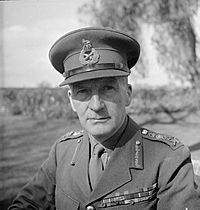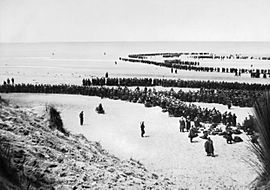1940 British war cabinet crisis facts for kids
Prime Minister
Foreign Secretary
In May 1940, during World War II, the British government faced a huge decision: should they try to make peace with Nazi Germany or keep fighting? The two main leaders with different ideas were the Prime Minister, Winston Churchill, and the Foreign Secretary, Lord Halifax. Their disagreement became a serious problem that could have caused Churchill's government to fall apart.
British soldiers were stuck at Dunkirk, and it looked like France was about to be defeated. Lord Halifax thought Britain should try to make a peace deal. He hoped that Mussolini, the leader of Italy (who was still neutral), could help arrange an agreement with Hitler.
On May 27, this idea was discussed by the War Cabinet, a small group of top government ministers. Churchill strongly disagreed. He urged everyone to fight on without talking about peace. He had support from two Labour Party members, Clement Attlee and Arthur Greenwood, and also from Sir Archibald Sinclair, the Liberal Party leader. Churchill's biggest challenge was that he wasn't the leader of the Conservative Party, which had most of the members in Parliament. He needed the support of the former Prime Minister, Neville Chamberlain, or he might have been forced to resign.
On May 28, Churchill cleverly called a meeting of his larger group of 25 ministers. At this meeting, everyone agreed to keep fighting. After this, Halifax accepted that his idea was rejected. Historians agree that Chamberlain's decision to support Churchill was a very important moment in the war.
Contents
Why Churchill Became Prime Minister
A New Leader for Wartime Britain
In 1935, the Conservative Party won the election, and Stanley Baldwin became Prime Minister. In 1937, Neville Chamberlain took over. Chamberlain tried to avoid war by giving in to Hitler's demands, a policy called "appeasement." After signing an agreement with Hitler in 1938, Chamberlain became worried by Hitler's continued aggression. In August 1939, Britain promised to support Poland if Germany attacked.
When Germany invaded Poland on September 1, 1939, Chamberlain declared war on Germany two days later. He formed a War Cabinet, which included Winston Churchill as the head of the Navy (First Lord of the Admiralty) and Viscount Halifax as Foreign Secretary.
Many people became unhappy with Chamberlain's leadership in spring 1940, especially after Germany invaded Norway. On May 7–8, Parliament debated the Norway campaign, which had gone badly for Britain. The debate turned into strong criticism of the government's handling of the war. The Labour Party called for a vote, which was basically a vote of no confidence in Chamberlain.
Churchill spoke at the end of the debate, defending Chamberlain. He said Britain was in great danger and urged Parliament to act carefully. The government won the vote, but their majority was much smaller than usual. This was a big blow to Chamberlain during a national crisis.
The next day, May 9, Chamberlain tried to form a national government that would include all major parties. He met with Churchill and Halifax and said he would resign if needed for Labour to join. Labour leaders Clement Attlee and Arthur Greenwood then joined the meeting. They said they would need to ask their party, but it was unlikely they would serve under Chamberlain. They said they could serve under another Conservative leader.
Earlier that day, Chamberlain had asked Halifax to become Prime Minister. Halifax was probably the Conservative Party's top choice. But Halifax said that as a member of the House of Lords (not the main Parliament), he would find it hard to lead the war effort. He felt he would have to let Churchill lead in the House of Commons. He didn't change his mind later that evening.
On the morning of Friday, May 10, Germany launched its "blitzkrieg" (lightning war) by invading Belgium, Luxembourg, and the Netherlands. Because of this new crisis, Chamberlain first said he wouldn't resign. But he waited for Labour's decision. Attlee called late that afternoon to confirm that Labour would join a government, but not with Chamberlain as leader.
So, Chamberlain went to Buckingham Palace at 6:00 pm and resigned. He told King George VI that Churchill should be his successor. The King then asked Churchill to form a new government. Churchill agreed, and the public heard the news on BBC Radio at 9:00 pm.
On May 11, the Labour Party agreed to join Churchill's new government. Churchill formed his War Cabinet, which at first had only five members. He was Prime Minister and also Minister of Defence. Attlee became Lord Privy Seal, and Greenwood became a Minister without Portfolio. Churchill's main challenge was that he wasn't the leader of the Conservative Party. So, he had to include Chamberlain in the War Cabinet and keep Halifax as Foreign Secretary.
The War Situation in May 1940
British Soldiers Trapped at Dunkirk
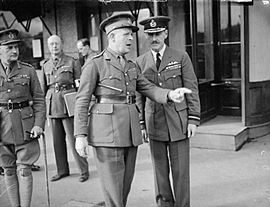
By May 21, German tanks were close to Boulogne-sur-Mer in France. Plans were being made to evacuate the British Expeditionary Force (BEF) if needed. About 400,000 Allied soldiers, mostly British, had retreated to the coast. Their hope was a counter-attack, but it didn't happen. The BEF commander, Lord Gort, decided that evacuation was the only choice. On May 23 and 24, the Royal Navy evacuated about 4,365 soldiers from Boulogne.
At a War Cabinet meeting on May 24, Churchill reported that many French troops were in Dunkirk. He said the port was working well. The War Cabinet also wanted to keep Italy out of the war. Halifax suggested that U.S. President Franklin D. Roosevelt could ask Mussolini what Italy wanted, hoping to avoid war.
On the morning of May 24, Hitler ordered his tanks to stop advancing. This was a key decision because it gave the British precious time to evacuate their soldiers from Dunkirk.
Events on Saturday, May 25
The War Cabinet met on May 25. Halifax reported on talks with an Italian diplomat. Boulogne surrendered that afternoon, and German forces attacked Calais. Dunkirk was the only port left for evacuation. Lord Gort warned that most equipment would be lost, and only a small number of soldiers might be saved.
The War Cabinet had a report called British Strategy in a Certain Eventuality. It said that if Germany got a strong hold in Britain, resistance would be impossible. Air defense was vital. Britain could not survive if Germany controlled the skies. The report concluded that Britain could probably resist invasion if the Royal Air Force (RAF) and Royal Navy remained strong. This became a key point for Churchill: Britain should fight on without peace talks. The report also said Britain couldn't win without help from America.
Late on May 25, Halifax met with Giuseppe Bastianini, the Italian ambassador. Halifax told him that Britain would consider any proposals for peace, "provided our liberty and independence were assured." This was reported to the War Cabinet the next day.
At this time, France and Britain wanted to keep Italy out of the war. But Halifax wanted Mussolini to help arrange a peace deal. This deal would give Hitler control of Europe but keep Britain and its empire safe. Some historians compare this to another "Munich Agreement," which was seen as giving in to Hitler. Halifax believed he was being realistic, but Churchill saw it as giving up.
Churchill ordered Lord Gort to move his troops north to Dunkirk and fight their way to the sea. He also ordered the Royal Navy to plan "Operation Dynamo" to evacuate soldiers from the ports and beaches. The RAF was told to control the air above the area.
War Cabinet Meetings: May 26 to 28
Over these three days, seven secret meetings were held. The Cabinet Secretary, Sir Edward Bridges, was always there to take notes. Military experts also attended.
Churchill's position as Prime Minister was still shaky. Chamberlain was still the leader of the Conservative Party, and Halifax was the preferred choice for many in the establishment. Churchill needed Chamberlain's support. The other two War Cabinet members were from the Labour Party, so Churchill wasn't sure he had enough support within his own cabinet. However, Arthur Greenwood strongly supported Churchill's decision to fight on.
Churchill invited Sir Archibald Sinclair, the Liberal Party leader, to attend the meetings. Sinclair was an old friend and a reliable supporter. Even with a four-to-two majority, Churchill couldn't risk Chamberlain and Halifax resigning. That would have brought the large Conservative majority in Parliament against him. So, he had to be very careful until he was sure of Chamberlain's support.
Sunday, May 26
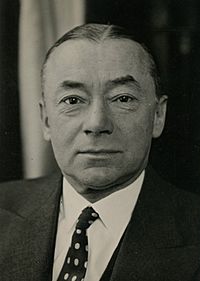
The French Prime Minister, Paul Reynaud, visited London on Sunday. He had lunch with Churchill and met with Halifax. The War Cabinet met twice that day.
First Meeting
Churchill began by explaining that the French military leaders didn't know about Lord Gort's decision to retreat to Dunkirk. But now they did and accepted it. There was no longer any hope of a counter-attack. Churchill expected France to collapse and feared Reynaud was coming to confirm it. Evacuating the BEF was now the top priority.
Churchill was still hopeful that "a good chance" existed to save many BEF soldiers. He wanted to convince Reynaud to keep fighting. He also asked his military chiefs to consider what would happen if France surrendered and Britain had to fight Germany and Italy alone. He asked if the Navy and Air Force could prevent an invasion and if Britain could handle small German raids.
Air Marshal Sir Cyril Newall reminded the cabinet of a report that said Britain could probably resist invasion if the RAF and Royal Navy remained strong. This supported Churchill's view.
Halifax then raised the idea of Italian mediation. He said Britain must accept that it's not about completely defeating Germany, but about "safeguarding the independence of our own Empire." He reported his talk with the Italian ambassador, who said Mussolini wanted peace in Europe. Halifax had replied that Britain would consider proposals if its "liberty and independence were assured."
Churchill responded strongly: "Peace and security might be achieved under a German domination of Europe. That we could never accept." He said Britain must ensure its "complete liberty and independence" and oppose any talks that would weaken Britain.
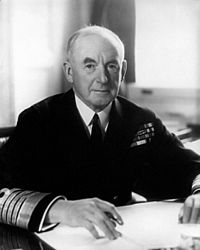
Chamberlain thought Italy would soon join Germany. Attlee pointed out that Mussolini would be nervous about Germany becoming too powerful. Halifax believed Britain wasn't strong enough to face Hitler alone, especially with France about to surrender and no help from America.
A military report was shared, saying that if France made a separate peace, Britain would "continue the fight single-handed." It also warned of strong actions against France if Germany occupied it. Halifax misunderstood part of the report, thinking Britain needed complete air superiority to fight alone. Newall corrected him, saying Britain only needed to prevent Germany from gaining complete air superiority to stop an invasion.
The meeting ended with approval for Lord Gort to retreat to Dunkirk. A fleet of ships would be gathered for evacuation.
Second Meeting
Calais fell to German forces on Sunday afternoon. The War Cabinet met again. Churchill described his lunch with Reynaud, who said the French military situation was desperate but he wouldn't sign a separate peace. Reynaud feared he might be forced to resign because others in his government wanted an armistice.
Churchill told Reynaud that Britain would "rather go down fighting than be enslaved to Germany." He was confident Britain could survive a German attack, but France must stay in the war. Reynaud confirmed Germany hadn't offered any peace terms yet.
Churchill suggested Halifax meet Reynaud. Before that, they briefly discussed Italy again. Reynaud wanted to keep Italy out of the war to free up French divisions. Halifax believed an approach to Italy must be made, trusting Mussolini to make Hitler more reasonable. Churchill didn't think it would work, but agreed to discuss it later. Churchill's main concern was French help with the BEF evacuation.
Churchill had to be careful with Halifax because Halifax had strong support in the Conservative Party. Chamberlain, however, didn't trust Mussolini and didn't want him involved in talks. Chamberlain's main goal was to keep France fighting. He was cautious about refusing Reynaud's requests.
Third Meeting
After Reynaud left, the War Cabinet met again. Churchill compared Britain's military strength to France's. He said Britain still had the power to resist, unlike France. If France couldn't defend itself, it was better for them to leave the war than drag Britain into a bad peace deal. Attlee and Chamberlain thought Hitler wanted to win the war before winter. Attlee stressed keeping France in the war so Hitler couldn't focus on Britain in 1940.
Churchill wanted France to keep fighting but stressed that Britain shouldn't be forced into peace talks before fighting seriously. Halifax openly disagreed. He thought it was more important to let France explore "possibilities of European equilibrium" through Mussolini. He said Britain might consider Italian demands. Greenwood and Chamberlain pointed out that Mussolini couldn't act independently of Hitler.
Churchill suggested they decide nothing about peace talks until the Dunkirk evacuation was done. He was hopeful many soldiers would be saved. The War Cabinet decided Halifax should write a draft message to Italy for discussion on Monday. They also agreed that Sinclair should join the War Cabinet for future talks about Italy.
Soon after, Churchill gave the order for "Operation Dynamo" to begin, which was the large-scale evacuation from Dunkirk.
Monday, May 27
Calais fell on May 27. That day, 7,669 soldiers were evacuated from Dunkirk harbor. The War Cabinet held three meetings.
Morning Meeting
This meeting focused on military strategy. There was no mention of talks with Italy. Mussolini was only briefly mentioned regarding when he might declare war.
Afternoon Meeting
Italy was the main topic. Halifax presented a memo suggesting an approach to Mussolini. The idea was to warn Mussolini about German domination and offer Italy a role in European settlements. Halifax had to add that the British ambassador in Rome said Mussolini was angry about earlier U.S. interference.
Churchill said there was a huge difference between talking directly to Mussolini and going through Roosevelt. Chamberlain thought the French plan was useless, expecting Italy to join the war anyway to get "spoils."
Sinclair completely opposed a direct approach to Mussolini. He worried it would damage national morale by looking weak. Attlee agreed, saying Mussolini would never be satisfied. Greenwood said it would be disastrous to approach Mussolini, as there wasn't time before France fell.
Churchill firmly rejected approaching Mussolini. He called it "futile, dangerous and ruinous" to Britain's fighting position. He said Britain must not be "dragged down the slippery slope with France." The best help Britain could give France was to assure them Britain would "fight it out to the end." He said if the worst happened, it wouldn't be bad for Britain to "go down fighting for the other countries which had been overcome by Nazi tyranny."
Chamberlain disagreed with the French proposal but suggested an outright refusal might not be wise while trying to keep France fighting. Halifax agreed with Chamberlain, saying he wanted France to fight on. But he felt Churchill had changed his mind. Halifax said he understood Churchill was open to discussing terms on Sunday, but now Churchill was defiant. Halifax said he couldn't agree with Churchill's plan while an acceptable settlement was still possible.
Churchill said he wouldn't join France in asking for terms, but he would consider any offer they received. Greenwood asked Halifax if a French approach to Mussolini would prevent French surrender. Halifax agreed it wouldn't, but still didn't want Britain to flatly refuse Reynaud. It was agreed Churchill should tell Reynaud to wait for Roosevelt's actions.
This meeting was very tense. Some historians say it was "perhaps the most critical moment of the war." Halifax threatened to resign. Churchill had the full support of Attlee, Greenwood, and Sinclair. He convinced Chamberlain that negotiations were pointless. Later, Churchill spoke to Halifax and calmed him down.
Evening Meeting
The War Cabinet met again with military chiefs, including General Sir John Dill, the new head of the army. They discussed Belgium's surrender, which was planned for midnight. Churchill wanted the French government to tell their generals to keep fighting.
Duff Cooper, the Minister of Information, asked what to tell the public about Calais falling, Belgium surrendering, and the BEF's dangerous position at Dunkirk. Churchill wanted the seriousness emphasized but no details published for security reasons. He forbade speculation about Operation Dynamo's outcome. Churchill also said he needed to make a statement in Parliament but thought it would take another week.
In his diary, Jock Colville noted that the Cabinet was "feverishly" considering if Britain could fight alone. He wrote that Halifax seemed "defeatist." Halifax believed Britain couldn't crush Germany and should focus on preserving its own independence.
Alexander Cadogan, who attended many meetings, wrote that Halifax thought of resigning after the afternoon meeting. Cadogan also noticed a difference between Chamberlain and Halifax's views. Halifax confirmed in his own diary that he seriously considered resigning. He felt Churchill and Greenwood "talked the most frightful rot" about the Italian proposal.
Tuesday, May 28
On May 28, 11,874 soldiers were evacuated from Dunkirk harbor and 5,930 from the beaches. The War Cabinet held two meetings.
Morning Meeting
This meeting discussed Belgium and the progress of Operation Dynamo. The War Cabinet told Duff Cooper to announce on BBC Radio that the BEF was fighting its way to the coast with help from the RAF and Royal Navy. Churchill would make a similar statement in Parliament.
They also discussed Italy. A message from Washington reported that Mussolini's response to Roosevelt was "entirely negative." The War Cabinet decided to tell the French to wait for developments, as Chamberlain had suggested.
"Hard and Heavy Tidings"
Churchill went to Parliament and made a short statement. He confirmed Belgium's surrender but said the Belgian government in exile would fight on. Churchill stressed that British and French armies were fighting and getting strong help from the RAF and Royal Navy. He couldn't give details but hoped to say more next week. He ended by saying:
Meanwhile, the House should prepare itself for hard and heavy tidings. I have only to add that nothing which may happen in this battle can in any way relieve us of our duty to defend the world cause to which we have vowed ourselves; nor should it destroy our confidence in our power to make our way, as on former occasions in our history, through disaster and through grief to the ultimate defeat of our enemies.
The acting Leader of the Opposition, Hastings Lees-Smith, thanked him and said Britain's resolve had not been fully tested. Sir Percy Harris for the Liberals said Churchill's words reflected the feelings of the whole nation.
Afternoon Meeting
This meeting was called to discuss another message from the French government, again asking for a direct approach to Italy by France and Britain. The argument between Churchill and Halifax started again, but this time Churchill was much firmer against any negotiations.
Halifax told his colleagues that the Italian embassy asked if Britain favored Italian mediation. Churchill argued that France wanted Mussolini to mediate between Britain and Hitler, which was unacceptable. Halifax said it depended on securing British independence, then Britain could make concessions to Italy. Churchill again used his "slippery slope" idea, saying things would be different after Germany failed to invade England.
Chamberlain now supported Churchill. He said there could be no concessions to Italy while the war continued. Any concessions would have to be part of a general settlement with Germany, not Italy. He doubted Mussolini wanted to join the war yet. Halifax insisted Britain might get better terms before France surrendered than later, after British factories were bombed.
Churchill returned to the French request for Mussolini's mediation. He believed Reynaud wanted Britain to meet Hitler. If that happened, the terms would be unacceptable, and Britain's will to fight would disappear. He concluded that Reynaud only wanted to end the war. Chamberlain agreed with Churchill but wanted to keep France fighting as long as possible. He suggested telling Reynaud that now was not the time to approach Mussolini.
Halifax reminded them Reynaud also wanted an appeal to Roosevelt. Churchill had no objection, but Greenwood accused Reynaud of "hawking" appeals around, seeing it as another attempt to leave the war.
Churchill said that if Mussolini became a mediator, he would take advantage, and Hitler wouldn't let Britain rearm. Churchill said, "We should get no worse terms if we went on fighting, even if we were beaten, than were open to us now." He reminded them that fighting would also cause Germany severe losses. Halifax still couldn't see what was wrong with trying mediation. But then Chamberlain said he didn't see what could be lost by fighting to the end.
The minutes confirmed the War Cabinet agreed with Chamberlain. Churchill declared that nations that fought on rose again, but those that surrendered were finished. He thought the chances of decent terms were "a thousand to one against."
Chamberlain called for a realistic view. He agreed with Halifax in principle that Britain should consider "decent terms" if offered, but he didn't believe an approach to Mussolini would lead to such an offer. He urged caution in replying to Reynaud to avoid giving France a reason to surrender immediately. The key was to phrase the reply so France wouldn't see it as a complete rejection, just that now wasn't the right time.
Attlee pointed out the need to consider British public opinion. He said the public would be shocked by the BEF's dangerous position. It was vital to keep public morale high, which would be impossible if the government showed weakness. Greenwood agreed, saying industrial workers would see any sign of weakness as a disaster.
The War Cabinet decided against the appeal to Roosevelt, calling it too early. Halifax suggested Churchill make a broadcast to the British Dominions (countries like Canada and Australia). Churchill said he would consider it, but not yet.
The meeting adjourned so Chamberlain and Halifax could draft the reply to Reynaud. Churchill wanted to speak to his larger group of ministers.
Churchill Meets with Other Ministers
As the War Cabinet adjourned, it was clear Halifax was alone in his views, especially with Chamberlain now supporting Churchill. But Halifax still had power within the Conservative Party. Churchill needed the approval of his wider group of 25 ministers for his policy of fighting on, even alone. He told them Britain was going to fight and not negotiate.
Hugh Dalton, a minister, remembered Churchill saying that Britain wouldn't get better terms now than if they fought it out. Germany's terms would include demanding the British fleet, and Britain would become a puppet state. Churchill ended dramatically, saying that if Britain's long story had to end, "let it end only when each one of us lies choking in his own blood upon the ground."
Dalton recalled that everyone in the room agreed, with no disagreement. Many ministers patted Churchill on the shoulder as they left. Leo Amery, another minister, wrote that the meeting "left all of us tremendously heartened by Winston's resolution." This meeting meant Halifax had been outmaneuvered, and Britain would fight to the end.
Historians like Max Hastings point out how much Churchill relied on Chamberlain's support. This was key to stopping Halifax's proposals. Churchill couldn't let Halifax resign because he needed the support of the large Conservative majority in Parliament. He had to keep Halifax in his government for seven more months to ensure Conservative support. It wasn't until December 1940 that Churchill felt able to send Halifax away to Washington.
There's a popular idea of a united Britain in 1940 standing firm against Hitler. Hastings says this was true, and it would have been different if another person had been Prime Minister. If the group wanting peace talks had won, Britain would have been out of the war, and Hitler might have won. In May 1940, Churchill understood that even thinking about peace terms would badly affect the country.
War Cabinet Reconvenes
This session was short. Churchill described the positive reaction of his other ministers. He said they were not alarmed by the situation in France and were very happy when he told them there was "no chance of our giving up the struggle." He said he had never heard people in high political positions express themselves so strongly.
Churchill read a letter from General Edward Spears in Paris, confirming support for the retreat to the coast. Chamberlain read the draft reply he and Halifax had prepared for Reynaud. Its purpose was to convince Reynaud that it was in France's interest to keep fighting. Churchill was happy with the draft, and Halifax was allowed to send it.
Halifax realized he was defeated, largely because of Churchill's strong will and Chamberlain's support for Churchill. With the idea of Mussolini's help rejected, the War Cabinet discussed asking the United States for help. Halifax showed them messages from South Africa and Australia, saying the Dominions wanted to tell the U.S. that they would fight on, even alone, for world liberty.
Halifax suggested asking the British ambassador in Washington if such a message would change American public opinion. Churchill thought any appeal to America now would be too early. He said the best way to gain America's respect was to make a bold stand against Hitler.
The War Cabinet concluded that the French idea of approaching Mussolini was pointless. Their reply to France should be respectful and show they considered both French and British views. Halifax was authorized to reply to Reynaud using the draft he and Chamberlain prepared. They also agreed that any approach to America should be like the Dominions suggested, not Reynaud's idea.
When the British message reached Paris, General Spears was with Reynaud. Reynaud had been pressured by others in his government to approach Mussolini. Spears said Churchill's strong will had a "magical effect" on Reynaud, who immediately stopped any further talks with Italy and decided to fight on.
Later Events
On Wednesday, May 29, the War Cabinet had a long meeting about military matters. Churchill's decision not to negotiate was confirmed when Halifax reported a message from the British ambassador in Rome. The ambassador was told that Italy's entry into the war was now certain, with only the date to be decided. Italy's Foreign Minister also said Mussolini would not listen to any offers from France. The War Cabinet then began plans to detain Italian citizens in Britain.
After 17,000 soldiers were evacuated from Dunkirk on May 28, about 50,000 per day were evacuated from May 29 to June 1. Operation Dynamo ended on June 4, when the French rearguard surrendered. About 338,226 soldiers were evacuated, far more than expected. Most of their equipment was lost. Many saw Dunkirk as a miracle. Churchill called it "a miracle of deliverance" in his "We shall fight on the beaches" speech. But he also reminded everyone that "Wars are not won by evacuations."
The Germans then moved south and invaded France on June 5. Mussolini declared war on June 10. German forces occupied Paris on June 14 and completed their conquest of France on June 25.
Chamberlain resigned from the War Cabinet on September 29, 1940, due to illness. He died on November 9. Churchill was then elected leader of the Conservative Party, which made his position as Prime Minister much stronger.
On December 12, the British Ambassador to the United States died. Churchill decided to remove Halifax and appointed Anthony Eden as Foreign Secretary. Halifax was offered the ambassador role in Washington, which he accepted. He stayed in that role until May 1946.
See also
- 2022 United Kingdom government crisis
- 1930 United Kingdom government crisis
 | William L. Dawson |
 | W. E. B. Du Bois |
 | Harry Belafonte |


